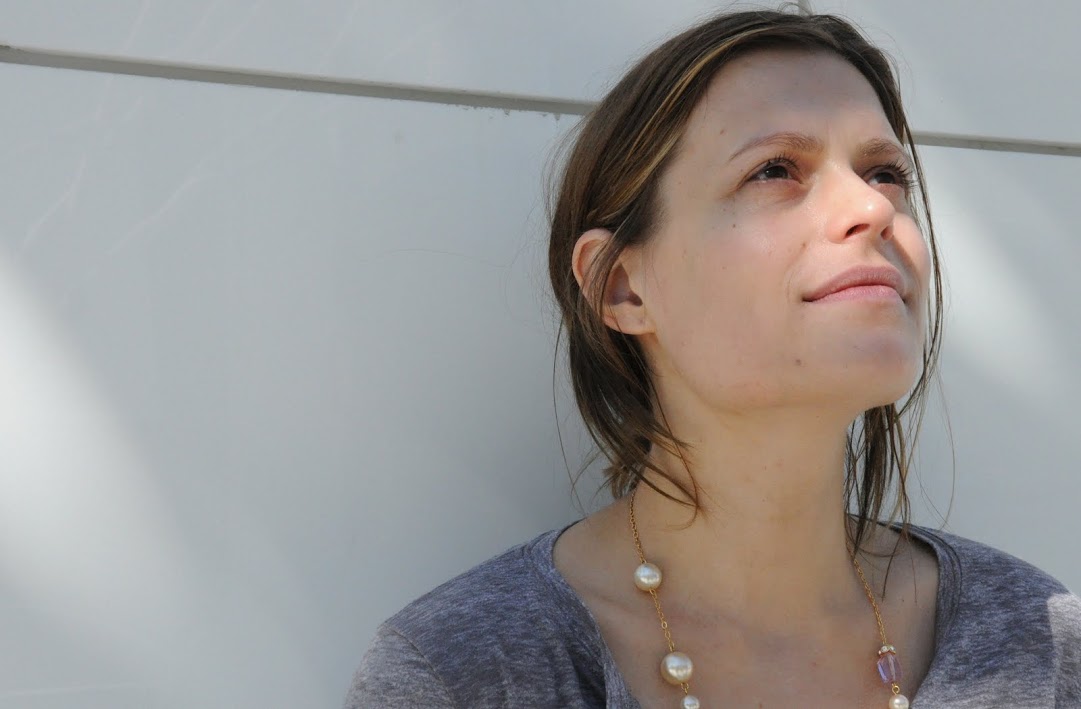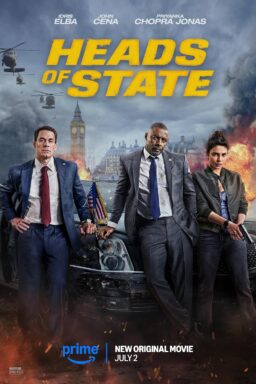(Author’s note: Normally, with this feature, I like to include the short film itself for you to enjoy. This month, however, the film featured is not yet available online. It will be premiering on HBO tonight, June 1st, at 9:00pm ET)
I have seen “The Lion’s Mouth Opens” (in two different versions) many times and it never gets any less devastating. I programmed the first version of the documentary as part of the 2014 Chicago Critics Film Festival and it was, without a doubt, the most memorable short film of that year. At only 15 minutes, the film conjured up strong emotions for everyone who watched it. Director Lucy Walker has since expanded the film to 26 minutes for HBO (which will premiere on June 1st at 9pm ET) and its impact has become even stronger. The film premieres during Huntington’s Disease Awareness Month, but the film will stay with the viewer for quite some time thereafter.
It concerns Marianna Palka, an independent filmmaker and actor best known for her film “Good Dick,” a Sundance hit that came out in 2008, which she wrote, directed and starred in with Jason Ritter. At the start of “The Lion’s Mouth Opens,” she prepares a dinner party for her friends and solemnly says to the camera, “I will better serve the world if I don’t have it. Nothing good can come from me having it.” The day after she has this dinner party, she will find out whether or not she carries the Huntington’s Disease mutation, a disease that Ritter (a guest at the party) accurately describes as “Parkinson’s mixed with Alzheimer’s,” which can take hold of the body and mind any time after the age of 30. If a parent has it, their offspring has a 50% chance of having it as well. Palka’s father had it. When she was 8 years old, it took hold of her father and completely altered their idyllic homelife.
No cure exists. Unlike Parkinson’s, no drug exists that can help keep the symptoms under control. Palka sees the disease as a kind of death sentence. Since deciding to take the test, her life has become a series of uncontrollable emotions, denial being her favorite (“denial is like a tropical island…”). The film states that fewer than 10% of those at risk of having Huntington’s Disease take the genetic test to see if they have the mutation. Before anyone can take the test, they have to have made out their will. Palka’s friends greatly admire her for the bravery she has demonstrated all her life. At age 17, she moved to New York from Scotland with only $100 in her pocket. Even in the 15-minute version, “The Lion’s Mouth Opens” gives a clear narrative of Palka’s life journey so far. She has lived a life that would make an interesting documentary in its own right.
Walker has made some notable additions to this version, including home movies of Palka’s father before the disease took hold. But perhaps the most notable addition comes in the form of an explanation of the film’s title, a poem written by Bob Dylan for Woody Guthrie, who died of the disease. Dylan wrote a five page poem that Palka can recite verbatim, which she does in the film. Here, Walker intercuts the recital with footage of people who have been afflicted with Huntington’s, including footage from Chris Furbee’s documentary “Huntington’s Dance,” which premiered at the Slamdance Film festival the same year Walker’s film premiered at Sundance. Here, the film gives the viewer a clear window into the disease and its unthinkable symptoms.
Walker and editor Joe Peeler wisely forgo any scoring or any other overly manipulative tactics to conjure up any emotions in the viewer. The film alternates smoothly between scenes of the dinner party to interviews with Palka, Ritter and her mother, to home movies of her family and, finally, a visit to the hospital. What the viewer comes away with is a sense of a tight circle of friends coming together for one in need. The film has a warmth and grace to it that most fictional films of this type rarely achieve.
Tell me how you got involved with the film.
LUCY WALKER: Marianna called me up. We had mutual friends and we had both been at Sundance at the time, but we had never gotten around to meeting up. But she saved my number and called me up and said she had a feeling that we should make a film and I thought ‘uh-oh.’ And I gave her my usual spiel, ‘sorry, I’m so busy, I’ve just finished another film, I’ve got so much to do… but tell me what it’s about and I’ll help you find someone else to help you.’ But when she told me what it was about, I must confess I was very moved. What a worthy cause that is. And she’s so good on camera, she’d be really good at raising awareness. And also I just wanted to give her a sense of purpose in this moment. Having a camera around can give a real sense of comfort when times are really trying. Some people can be comforted by the fact that their suffering might be helping somebody else in the future.
I wasn’t really thinking of it as “my next film” or finding the audience that it has. I just brought my game and do what I normally would do and just figure out what to shoot. It was my recommendation that we shoot something before (the test). And so the dinner scene in (Walker’s 2013 documentary) “Crash Reel” worked really well and I enjoyed shooting that and so we talked about having a dinner party where her friends gave her gifts for the journey and we just capture a little bit of her life beforehand. It was a gift for Marianna really.
Talk about the use of the Bob Dylan poem.
We included that sequence because the short version we actually loved and it did very well at film festivals. It’s a very tense-filled short. You could hear a pin drop during it. When HBO talked to me about broadcasting it, I got really excited but they said they can’t broadcast something that’s not a half-hour. I initially thought “how can I make it longer? It’s working so well as a compressed short.” I really liked how claustrophobic and intimate it was. It just sort of sucks you into this moment. But then one question people had when watching the film was that it was so hard to get their head around the particularities of (Huntington’s Disease), why it’s so cruel and unusual and why it’s so uniquely challenging. And so we had this poem that Marianna recites by Bob Dylan and we wanted to show the symptoms. I designed that sequence to, in a rather poetic way, to show the symptoms.
I’ve seen the shorter version many times and now I can’t imagine the film without that sequence. So, was it more of a practicality to have a 15-minute short for film festivals?
The way the sequence unfolded actually was, the editor and I thought that we didn’t have much footage, to be honest. We’re on a tight budget because I’m paying for everything myself. And so this is for Huntington’s Disease Awareness, right, so we’re editing it and thinking that Marianna and her friends are so incredibly captivating. I knew that the goal was to raise awareness for Huntington’s Disease. So, I really wanted to make it work. It was a bit of a challenge. I wasn’t sure how we were going to make it work. I knew that it would be very valuable to the community. Finally, I just said to the editor “come on, let’s just give it a go. It’ll be so great for the community if we can make it work. Let’s just see if we can.”
And we didn’t have much. We had the poem and not much else. My main note to myself after the short version was ‘this is great, but people don’t know why it’s such a difficult disease. We have to show it.’ And I think with that first version, I shied away from it. We tend to be quite shy and I think sometimes your first instinct is to not show it and that is a good instinct in the sense that it feels respectful, but actually when you get into that community, they really want people to understand it and they really want people to recognize it. Because a lot of challenges they face have to do with when people don’t recognize the symptoms when they come across them.
There’s a horrible story about a cop beating up a guy with symptoms and arrested him because they told him to stop moving and they thought he was resisting arrest, but his movements got more out of control the more agitated he got. And he couldn’t explain himself and they thought he was just some resistant drug addict. So, the community wants this stuff to be seen, so I had to swallow that kind of shyness and try to find a way to accomplish that with not much footage.
And then I hit upon the idea of reaching out to the community and finding other people who have had families that they could film.
In the shorter version, you ended with Marianna saying that her dream was over and now there’s a new dream. With this longer version, in the same interview, you let it go a little longer with her talking about everyone having a demise. Can you talk about that editing choice?
The editor and I went back and forth and I think that’s the sort of thing that divides people. I think the longer version is a bit harder to bear. It’s a bit more of a gut punch. There’s a Philip Larkin poem it reminds me of called “The Old Fools” and it’s about old people and these sort of terrible things they do and what it would be like to be them and the last line is “well, we shall find out.” And I always felt devastated by that line and with this, I really like it and I think her comment “we are all facing a demise,” and I think what an incredibly mature way to… recognize that inevitable place for all of us as long as we’re honest with ourselves as human beings and I thought that was such a profound statement of Marianna’s.
And yet it’s easier for her to say “hey, I’ve got a new plan.” It’s also a beautiful line. I think it’s more challenging last line to do it this way. I kind of dig it. I think it’s one of those things, some people like chocolate ice cream, some people like vanilla ice cream. To me, I kind of like them both, but it’s one of those decisions that aren’t easy decisions. I’m kind of like 50-50. I just think the what she says in the longer version is so profound and ultimately the most mature response.
Do you foresee a follow-up documentary at some point?
Yeah, absolutely. We’ve been going one step at a time and letting Marianna lead the way. We have in mind another kind of documentary in having Marianna exploring and researching Huntington’s. She’s actually been super-busy. She just directed a movie that I think is really good, I was quite blown away by it. It’s called “Worthy.” It’s like an indie “Bridesmaids.” It’s quite a broad comedy. She’s quite hilarious and touching. So, she’s been busy doing that and she she’s just fallen in love, which is lovely. So, I’ve been letting her lead the way. I’ve been so happy. This is like a dream come true to be able to raise so much awareness with the HBO broadcast. We’ve been so busy, making the movie longer and getting it out there. It’s just been a whirlwind that I hadn’t really planned on and it’s not really my day job. We haven’t been able to shoot any new footage yet, but I’m really excited about filming the next part, which is Marianna researching the cure. I think that’s gonna be really good.
For more information on The Lion’s Mouth Opens and Huntington’s Disease, please visit:













